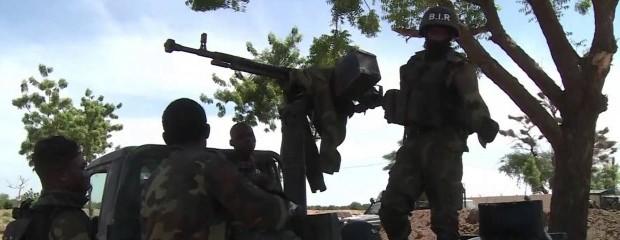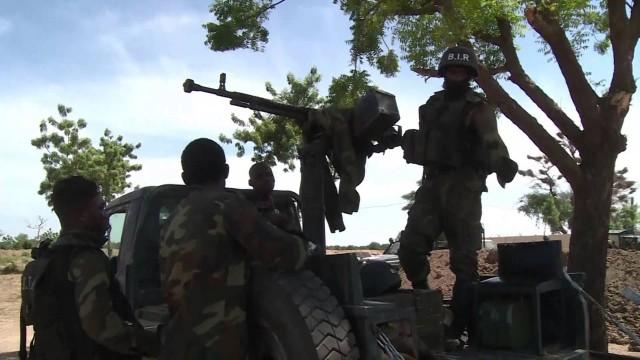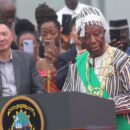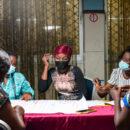Boko Haram, Islamic State, and the underlying concerns for West Africa

Last year, Boko Haram pledged allegiance to the Islamic State. What’s come of it?

Military regroup after a Boko Haram attack in Cameroon.
When Boko Haram released a recording in March 2015 in which its leader pledged allegiance to the Islamic State, many analysts believed the announcement would primarily have value as propaganda.
After all, the feasibility of close operational ties between two of the world’s most notorious Islamist militant groups – one based in Syria and Iraq, the other thousands of miles away in Nigeria and the Lake Chad region – is limited. However, a year later, there is evidence of some effects from the nominal alliance.
Most notably, there have been some reported concrete operational links to date, while the pledge also seems to have added a layer of legitimacy to Boko Haram’s goals. Consequently, there have been a small but growing number of individuals making their way from across West Africa to join the group as well as reports of Boko Haram fighters joining the fight in Libya.
While still marginal, these dynamics might indicate the more subtle effects of last year’s pledge and could provide a potentially lasting source of concern throughout the region if not addressed.
What evidence is there that Boko Haram is expanding its membership?
In November 2015, Senegalese national Makhtar Diokhané was arrested in Niger. He was reportedly on his way to secure the release of four Senegalese men who were being held in prison there. These detainees had been caught with counterfeit money, but were reportedly on their way back to Senegal after fighting with Boko Haram.
Diokhané’s capture led to further arrests in Senegal, including Diokhané’s wife, imams that had been preaching extremist ideology, and relatives of other Senegalese nationals fighting with Boko Haram.
This episode shed light on what seemed to be a previously unknown pipeline of Senegalese militants to Nigeria. This news – added to other reports of Senegalese nationals joining the Islamic State in Iraq, Syria, and Libya – shattered assumptions about the country’s imperviousness to the influence of Islamist militancy.
In addition, the alarming admission by Diokhané and the four detainees that they were planning on setting up a Boko Haram cell in Senegal, and may have even had the support of the group’s leadership, suggested an expansionist desire by Boko Haram beyond the confines of its historical areas of operation.
Elsewhere, in January 2016, Malian authorities detained four West African nationals (two from Guinea Bissau, and one each from The Gambia and Guinea) who were reportedly passing through the country on their way to join Boko Haram.
Then, in February 2016, eight more Senegalese were arrested in Mauritania also allegedly planning to join the group. Those eight claimed that at least 23 Senegalese had become Boko Haram members since 2015, while one of the previously arrested suspects in Niger indicated that Boko Haram membership includes the presence of some Mauritanians as well.
Do these incidents add up to a new dynamic?
Non-Nigerian membership within Boko Haram is not necessarily a new phenomenon. While principally a Nigerian movement during the days of founder Muhammad Yusuf, who was killed in 2009, adherents originating from Nigeria’s neighbours were not uncommon even then.
However, more recently, as Boko Haram has experienced losses in both personnel and popularity at home and expanded operations into the Lake Chad Basin, the group has compensated by actively recruiting more heavily in southern Niger, northern Cameroon, and Chad.
There has also been a steady stream of allegations in recent years – though little concrete evidence – that the group employs nationals from countries not contiguous to Nigeria. For example, Seini Boukar Lamine, a Cameroonian traditional leader who spent three months as a hostage of the sect in 2014, stated that he saw many “fair-skinned combatants” possibly from “Sudan, Algeria, and other Arab countries” during his time in captivity.
In this sense, the inclusion of fighters from beyond Nigeria and perhaps even beyond the Lake Chad Basin is not necessarily new, though it may be reaching new levels in West Africa. So far, the cases seem to be isolated incidents, but there is the possibility these few known examples form part of a larger pattern or that they could inspire similar journeys in the future.
[See: How Boko Haram keeps its secrets secret]
What role has the pledge to the Islamic State played?
Far from irrelevant, Boko Haram’s pledge has likely had a significant role in adding a layer of international legitimacy to the organisation, giving it a greater ability to attract likeminded individuals in the region.
Islamic State actors and sympathisers have often called for supporters to migrate to the group’s areas of operation outside of Syria or Iraq, and the attempted flight of fighters to the Lake Chad Region may be evidence of this message reverberating in West Africa. It is notable that there have not been recent reports of Senegalese going to northern Mali in similar numbers, perhaps suggesting they are more susceptible to messaging from the Islamic State than al-Qaeda.
At the same time, Boko Haram has also experienced an outflow of its own fighters, primarily to Libya. In early 2015, both the Libyan Foreign Minister and Chadian President Idriss Déby noted Boko Haram’s presence in Libya, while eyewitnesses remarked that a parade was held in Sirte to welcome fighters from Nigeria in April 2015.
Boko Haram analyst Jacob Zenn has also claimed between 80 to 200 militants arrived in Sirte by late summer last year, a dynamic an official from the US military operation AFRICOM seemingly confirmed in December 2015 when he stated: ”there have been some Boko Haram that went north and joined [Islamic State]”.
The official added that “fortunately, not many of them came back”, though those that did may have returned with advanced tactics and training, a fact the US military attributed to shifts in Boko Haram roadside IED formation in early 2016.
[See: Western partners can’t provide military assistance to fight Boko Haram, but here’s what they can do]
What does this mean for the future?
While the movement of militants throughout the region is concerning, the broader West African region is not at immediate risk from Boko Haram. While AQIM is trying to expand its presence as seen in recent high-profile attacks, Boko Haram’s defensive position in the face of continued military pressure in northeast Nigeria and Cameroon means that it is difficult to imagine the group extending its reach any time soon.
[See: Boko Haram is not “defeated” but Buhari’s strategy is working]
Recent Boko Haram attack patterns have also been very different from al-Qaeda in the Islamic Maghreb’s (AQIM) foreign-national directed violence in Ouagadougou and Grand Bassam, and are instead characterised by a higher degree of indiscriminate local civilian targeting, which may not engender support in new locations.
In addition, Boko Haram targeting has largely been predicated on revenge, such as increased violence against civilians due to their perceived support for vigilante groups, or attacks in Niger and Chad following their militaries’ involvement in regional operations to counter the sect. In this sense, it would take a dramatic shift in calculus and capabilities for other locations in West Africa to come under fire from an organisation struggling to maintain an offensive in its current operating areas.
Nonetheless, the attraction – thus far minimal but present – of likeminded individuals throughout the region is cause for concern, especially if they return to their home countries to spread radical ideology as per Diokhané’s plan.
Boko Haram’s pledge to the Islamic State may not have yielded catastrophic consequences thus far, but it has facilitated the inflow of new fighters to Boko Haram and the outflow of Boko Haram militants to other battlegrounds. The resulting spread of militant Islamist ideology and tactics is an important development, and certainly warrants enhanced monitoring to avoid disastrous consequences in West Africa for years to come.
Omar S. Mahmood is an analyst focused on the Lake Chad and Horn of Africa regions, and can be reached on Twitter @omarsmahmood.




